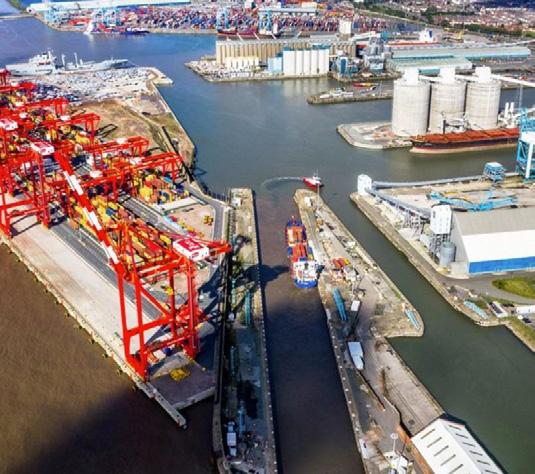
3 minute read
Port job losses
UK PORT WARNS JOB LOSSES AHEAD
The UK’s Port of Liverpool is to restructure its containers division and has confirmed it will shortly start a redundancy consultation process.
The news follows a marked deterioration in the volume of containers handled by the port plus strike action in recent weeks by Unite the Union, which has rejected a 10.2% increase in basic pay.
“We have seen an increasing decline in the movement of containerised cargo for Liverpool over the last few months, in line with industry figures which show a 4.6% drop in volume across Europe. ”This, together with a recent sharp fall in container vessel charter rates of around 50%, indicates a rapid decline in throughput is expected over the next few months,” said a
Credit: Peel Ports Group
spokesperson for Peel Ports Group, which operates the Port of Liverpool.
8 The Port of Liverpool, like many
other ports, is experiencing a significant decline in volume due to the current economic crisis
ALL CHANGE AT TOP OF TORQEEDO
Fabian Bez stepped into the CEO post on October 1, and on November 1, Heiko Vietmeier will join as CFO of Torqeedo, the marine electric drive maker.
The two will replace Dr Markus Müller, CTO and CSO of Torqeedo’s parent company DEUTZ AG, and Dr Alf Harkort, who served as interim managing directors while the search was on for new leaders.
Fabian Bez has experience in strategic corporate development, including electrification and batteries, working at Webasto Thermo as divisional CEO. He has also worked as a consultant in alternative drives and renewable energy.
8 Fabian Bez
Heiko Vietmeier will begin his new role on November 1, coming from Defontaine Group, a manufacturer of slewing bearings for a range of applications including wind turbines and transport.
He has first and master’s degrees in business and accounting and is a chartered accountant.
Torqeedo was founded in 2004 in Bavaria, near Munich, when Christoph Ballin and Friedrich Böbel began to look into electric boat propulsion.
8 Heiko Vietmeier

Norway commits to 2050 fleet decarbonisation
Norway has committed to making its entire fleet of vessels – from small boats to commercial ships – carbon neutral by 2050.
Speaking at the recent SeaTech 2022 exhibition and conference in France, Johann Johan Hammerstrøm, first secretary at the Norwegian Embassy in Paris, told delegates that already in place was a law allowing only zero-emissions vessels on its fjords as early as 2026.
“Norway has the world’s fifth largest commercial fleet, the second largest offshore fleet, the second biggest oil and gas fleet and seven per cent of the world fleet,” he said. “But we consider ourselves as a front runner, a pioneering country in terms of implementing projects such as the world’s first fully electric ferry in 2015.
“We have 103 private companies involved in the initiative, as well as green ports and 70 electric or hybrid ferries in circulation today.”
Hydrogen was one of the key fuels that Norway was focusing on, he said, which would be used for short or medium-distance ships.
“We will be launching a hydrogen ferry later this year,” he said.
BAN ENFORCED ON DUMPING SEWAGE AT SEA
The London Protocol has been amended so that sewage sludge can no longer be dumped in the ocean.
Sewage sludge was formerly on the list of permissible wastes that can obtain dumping permits, but after a proposal was submitted by South Korea and Mexico it was removed and dumping is now prohibited worldwide.
Adopted at a meeting at the London headquarters of the IMO on October 7, the amendment has come about after a worldwide review of dumping practice concluded that it had declined considerably anyway over recent decades, with many regional conventions already banning it through domestic legislation.
However according to Annex 1 of a ‘reverse list’, the list of materials that can still be considered for dumping at sea includes inorganic geological material, vessels and platforms or other manmade structures and ‘specific bulky items’.







